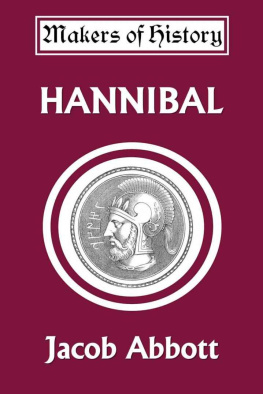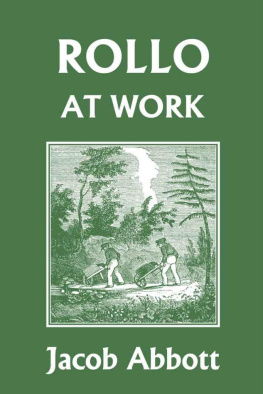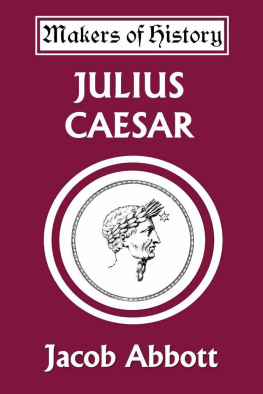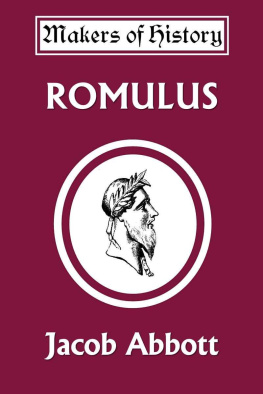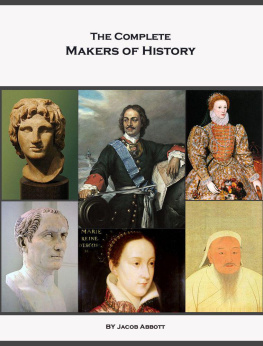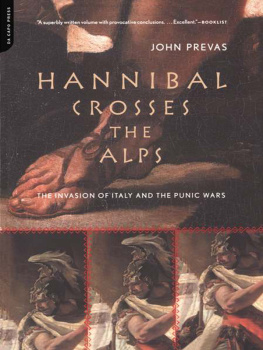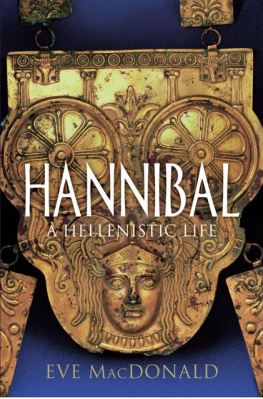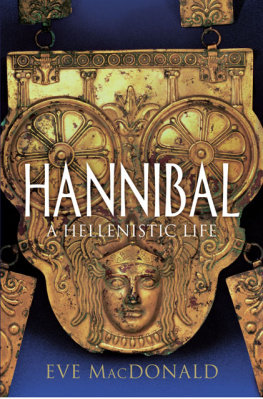Jacob Abbott - Hannibal (Makers of History)
Here you can read online Jacob Abbott - Hannibal (Makers of History) full text of the book (entire story) in english for free. Download pdf and epub, get meaning, cover and reviews about this ebook. year: 2007, publisher: Yesterdays Classics, genre: History. Description of the work, (preface) as well as reviews are available. Best literature library LitArk.com created for fans of good reading and offers a wide selection of genres:
Romance novel
Science fiction
Adventure
Detective
Science
History
Home and family
Prose
Art
Politics
Computer
Non-fiction
Religion
Business
Children
Humor
Choose a favorite category and find really read worthwhile books. Enjoy immersion in the world of imagination, feel the emotions of the characters or learn something new for yourself, make an fascinating discovery.
- Book:Hannibal (Makers of History)
- Author:
- Publisher:Yesterdays Classics
- Genre:
- Year:2007
- Rating:5 / 5
- Favourites:Add to favourites
- Your mark:
- 100
- 1
- 2
- 3
- 4
- 5
Hannibal (Makers of History): summary, description and annotation
We offer to read an annotation, description, summary or preface (depends on what the author of the book "Hannibal (Makers of History)" wrote himself). If you haven't found the necessary information about the book — write in the comments, we will try to find it.
Hannibal (Makers of History) — read online for free the complete book (whole text) full work
Below is the text of the book, divided by pages. System saving the place of the last page read, allows you to conveniently read the book "Hannibal (Makers of History)" online for free, without having to search again every time where you left off. Put a bookmark, and you can go to the page where you finished reading at any time.
Font size:
Interval:
Bookmark:
Yesterday's Classics republishes classic books for children from the golden age of children's literature, the era from 1880 to 1920. Many of our titles are offered in high-quality paperback editions, with text cast in modern easy-to-read type for today's readers. The illustrations from the original volumes are included except in those few cases where the quality of the original images is too low to make their reproduction feasible. Unless specified otherwise, color illustrations in the original volumes are rendered in black and white in our print editions.
The author of this series has made it his special object to confine himself very strictly, even in the most minute details which he records, to historic truth. The narratives are not tales founded upon history, but history itself, without any embellishment or any deviations from the strict truth, so far as it can now be discovered by an attentive examination of the annals written at the time when the events themselves occurred. In writing the narratives, the author has endeavored to avail himself of the best sources of information which this country affords; and though, of course, there must be in these volumes, as in all historical narratives, more or less of imperfection and error, there is no intentional embellishment. Nothing is stated, not even the most minute and apparently imaginary details, without what was deemed good historical authority. The readers, therefore, may rely upon the record as the truth, and nothing but the truth, so far as honest purpose and a careful examination has been effectual in ascertaining it.
H ANNIBAL was a Carthaginian general. He acquired his great distinction as a warrior by his desperate contests with the Romans. Rome and Carthage grew up together on opposite sides of the Mediterranean Sea. For about a hundred years they waged against each other most dreadful wars. There were three of these wars. Rome was successful in the end, and Carthage was entirely destroyed.
There was no real cause for any disagreement between these two nations. Their hostility to each other was mere rivalry and spontaneous hate. They spoke a different language; they had a different origin; and they lived on opposite sides of the same sea. So they hated and devoured each other.
Those who have read the history of Alexander the Great, in this series, will recollect the difficulty he experienced in besieging and subduing Tyre, a great maritime city, situated about two miles from the shore, on the eastern coast of the Mediterranean Sea. Carthage was originally founded by a colony from this city of Tyre, and it soon became a great commercial and maritime power like its mother. The Carthaginians built ships, and with them explored all parts of the Mediterranean Sea. They visited all the nations on these coasts, purchased the commodities they had to sell, carried them to other nations, and sold them at great advances. They soon began to grow rich and powerful. They hired soldiers to fight their battles, and began to take possession of the islands of the Mediterranean, and, in some instances, of points on the main land. For example, in Spain: some of their ships, going there, found that the natives had silver and gold, which they obtained from veins of ore near the surface of the ground. At first the Carthaginians obtained this gold and silver by selling the natives commodities of various kinds, which they had procured in other countries; paying, of course, to the producers only a very small price compared with what they required the Spaniards to pay them. Finally, they took possession of that part of Spain where the mines were situated, and worked the mines themselves. They dug deeper; they employed skillful engineers to make pumps to raise the water, which always accumulates in mines, and prevents their being worked to any great depth unless the miners have a considerable degree of scientific and mechanical skill. They founded a city here, which they called New Carthage Nova Carthago . They fortified and garrisoned this city, and made it the center of their operations in Spain. This city is called Carthagena to this day.
Thus the Carthaginians did every thing by power of money. They extended their operations in every direction, each new extension bringing in new treasures, and increasing their means of extending them more. They had, besides the merchant vessels which belonged to private individuals, great ships of war belonging to the state. These vessels were called galleys, and were rowed by oarsmen, tier above tier, there being sometimes four and five banks of oars. They had armies, too, drawn from different countries, in various troops, according as different nations excelled in the different modes of warfare. For instance, the Numidians, whose country extended in the neighborhood of Carthage, on the African coast, were famous for their horsemen. There were great plains in Numidia, and good grazing, and it was, consequently, one of those countries in which horses and horsemen naturally thrive. On the other hand, the natives of the Balearic Isles, now called Majorca, Minorca, and Ivica, were famous for their skill as slingers. So the Carthaginians, in making up their forces, would hire bodies of cavalry in Numidia, and of slingers in the Balearic Isles; and, for reasons analogous, they got excellent infantry in Spain.
The tendency of the various nations to adopt and cultivate different modes of warfare was far greater in those ancient times than now. The Balearic Isles, in fact, received their name from the Greek word ballein , which means to throw with a sling. The youth there were trained to perfection in the use of this weapon from a very early age. It is said that mothers used to practice the plan of putting the bread for their boys' breakfast on the branches of trees, high above their heads, and not allow them to have their food to eat until they could bring it down with a stone thrown from a sling.
Thus the Carthaginian power became greatly extended. The whole government, however was exercised by a small body of wealthy and aristocratic families at home. It was very much such a government as that of England is at the present day, only the aristocracy of England is based on ancient birth and landed property, whereas in Carthage it depended on commercial greatness, combined, it is true, with hereditary family distinction. The aristocracy of Carthage controlled and governed every thing. None but its own sons could ordinarily obtain office or power. The great mass of inhabitants were kept in a state of servitude and vassalage. This state of things operated then, as it does now in England, very unjustly and hardly for those who were thus debased; but the result wasand in this respect the analogy with England still holds goodthat a very efficient and energetic government was created. The government of an oligarchy makes sometimes a very rich and powerful state, but a discontented and unhappy people.
Font size:
Interval:
Bookmark:
Similar books «Hannibal (Makers of History)»
Look at similar books to Hannibal (Makers of History). We have selected literature similar in name and meaning in the hope of providing readers with more options to find new, interesting, not yet read works.
Discussion, reviews of the book Hannibal (Makers of History) and just readers' own opinions. Leave your comments, write what you think about the work, its meaning or the main characters. Specify what exactly you liked and what you didn't like, and why you think so.

